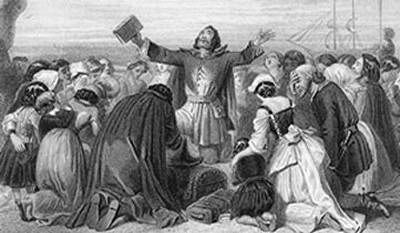The separation from the Catholic Church did not please everyone. Soon after the new church was formed, people were becoming dissatisfied with the leadership and morals just as they were with the Catholic Church. They disagreed with the idea of corrupt leaders in the Catholic Church such as the Pope. But replacing the Pope with a King, whose main motivation was strictly political, did not keep them from speaking out against the Church of England. They believed religious leadership should come solely from scripture. These people were known as Puritans. The Puritans, fearing persecution from the Monarch and other followers of the Church of England, decided to re-establish the Church and move to a place where they could freely practice their religion without the corruption of the government getting in their way. They did not wish to separate themselves from the Church of England but to reform it in their own society. They wished the "purify" it and turn the Church into was it was like during the time of Christ. To ensure there would be no corruption in their newly established church, the Puritans acquired their knowledge for their religion from reading the text of the Bible. People could interpret the text on their own. This was greatly different from the Catholic Church or the Church of England who had a more authoritarian structure with corrupt priests who might interpret the scripture to only benefit the Church or Monarch. Because the Puritans based their religion on the text, they stressed education which enabled them to become a complex and highly functional society in the New World (http://xroads.virginia.edu/~cap/puritan/purhist.html).
The leadership of the Puritans was generally based on class and education but every member of the congregation had to do their part for the community in the New World. Offices held within the Church and town were selected by community elections and legislation was established in town meetings. This was another way to prevent corruption in their purified society. The highest authority was always God's word from the Bible, but the Puritans came up with covenants to ensure the functionality of the community. The covenants bound the people of the community together. Since the Church was the only source of government, anyone who wished to break a covenant was not only banned from the Church, but their property was taken from them as well (http://public.wsu.edu/~campbelld/amlit/purdef.htm).
I admire the Puritan's beliefs and boldness to take on the New World in order to freely practice their religion. They were highly educated which enabled them to form their own society and in their own sense, they accomplished purity to the best of their ability. Their extremely strict covenants and sometimes ridiculous interpretations of the Bible make me feel sorry for the people who were born into the society. Like the original Puritans who were persecuted in England for disagreeing with society's rules, the later generations probably had a difficult time accepting the extreme beliefs. The pressure of the community to live perfect lives one hundred percent of the time or risk damnation had to be stressful. The stress is what I believe brought about the dark reputation of the Puritans such as their witch hunts and extreme punishments for mild acts of mischief.




No comments:
Post a Comment